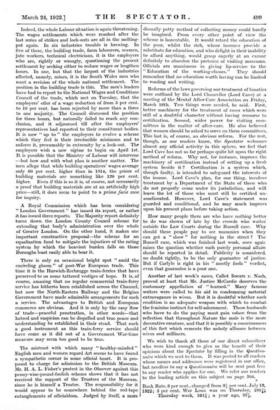Indeed, the whole Labour situation is again threatening. The wages
settlements which were reached after the last series of strikes and lock-outs are all in the melting- pot again. In six industries trouble is brewing. In five of these, the building trade, farm labourers, seamen, jute workers, technical electricians, it is the employers who are, rightly or wrongly, questioning the present settlement • by seeking either to reduce wages or lengthen hours. In one, but that the largest -of the industries affected, namely, mines, it is the South Wales men who want a revision of the whole national settlement. The position in the building trade is this. The men's leaders have had to report to the National Wages and Conditions Council of the trade, which met on Tuesday, that the -employers' offer of a wage reduction of from 5 per cent. to 10 per cent. has been rejected by more than a three to one majority. The Council discussed the position for three hours, but naturally failed to reach any con- clusion, and it adjourned till after the employers' -representatives had reported to their constituent -bodies. It is now " up to " the employers to evolve a scheme which they feel is their irreducible minimum and to enforce it, presumably in extremity by a .lock-out. The employers wish a new regime to -begin on April 1st. It is possible that -the Ministry of Labour will intervene —but how and with what plan is another matter. The men allege that while building operatives' wages average only 60 per cent. higher than in 1914, the prices of building materials are something like 120 per cent. higher. Even if this is so it is, of course, not necessarily a proof that building materials are at an artificially high price—still, it does seem to point to a prima fade case for inquiry.


































































 Previous page
Previous page